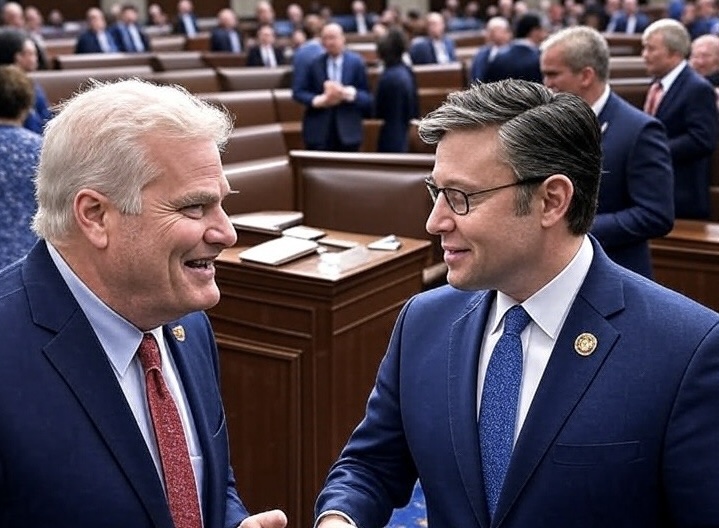
In a landmark move for the cryptocurrency industry, the U.S. House of Representatives has designated July 14–18, 2025, as “Crypto Week,” a dedicated period to review transformative legislation that promises to propel the United States to the forefront of blockchain innovation. Announced by House Speaker Mike Johnson, House Financial Services Committee Chairman French Hill, and House Agriculture Committee Chairman GT Thompson, this initiative underscores a bold commitment to making America the “crypto capital of the world.” With three pivotal bills on the table—the GENIUS Act for stablecoins, the CLARITY Act for crypto market structure, and the Anti-CBDC Surveillance State Act—Crypto Week is poised to set the stage for a new era of financial innovation, consumer protection, and economic growth.
The GENIUS Act: Stablecoins Take Center Stage
The centerpiece of Crypto Week is the GENIUS Act, a bill already passed by the Senate with bipartisan support in a 68-30 vote on June 17, 2025. This legislation establishes the first federal framework for U.S. dollar-pegged stablecoins, a rapidly growing segment of the crypto market that facilitates seamless digital transactions. By requiring stablecoin issuers to back their tokens with liquid assets like U.S. dollars and Treasury bills, and to disclose reserve compositions monthly, the GENIUS Act ensures transparency and consumer confidence. This regulatory clarity is a game-changer, opening the door for banks, fintechs, and retailers to issue stablecoins and integrate them into everyday payments.
Industry leaders are buzzing with excitement. “This opens the floodgates,” said Christian Catalini, a noted crypto expert, emphasizing how the GENIUS Act will spur competition and innovation by allowing more issuers to enter the market. From major players like JPMorgan Chase, which launched its JPMD deposit token, to retail giants like Amazon and Walmart exploring stablecoin offerings, the legislation is sparking a wave of adoption that could reshape global finance. Stablecoins, already handling $28 trillion in transactions last year—surpassing Mastercard and Visa combined—are set to become a cornerstone of digital payments.
The CLARITY Act: Building a Robust Crypto Ecosystem
Complementing the GENIUS Act, the Digital Asset Market Clarity Act (CLARITY Act) aims to provide a comprehensive regulatory framework for the broader crypto market. Advanced by the House Financial Services and Agriculture Committees, this bill clarifies the roles of the Securities and Exchange Commission (SEC) and the Commodity Futures Trading Commission (CFTC) in regulating digital assets. By mandating retail financial disclosures and the segregation of corporate and customer funds, the CLARITY Act fosters trust and stability, ensuring that the crypto market operates with integrity.
House Majority Whip Tom Emmer has championed the bill, emphasizing its role in delivering on President Trump’s vision for a crypto-friendly America. “The president promised this, and we want it done now,” Emmer declared at the Bitcoin 2025 conference. The CLARITY Act is seen as a catalyst for bringing financial institutions, including banks and brokers, into the digital asset ecosystem, paving the way for mainstream adoption. With the SEC retreating from aggressive enforcement under new leadership, the path is clear for innovation to flourish.
The Anti-CBDC Surveillance State Act: Prioritizing Freedom and Innovation
Rounding out Crypto Week is the Anti-CBDC Surveillance State Act, led by Majority Whip Tom Emmer, which seeks to block the Federal Reserve from issuing a central bank digital currency (CBDC) directly to individuals. This bill reflects a commitment to preserving financial freedom and preventing potential government overreach in the digital realm. By prioritizing private-sector stablecoins over CBDCs, the legislation aligns with President Trump’s executive order supporting dollar-backed stablecoins as a tool to maintain the U.S. dollar’s global dominance.
Vice President JD Vance has called stablecoins a “force multiplier” for U.S. economic power, highlighting their potential to serve the unbanked and underbanked populations worldwide. Tether’s CEO, Paolo Ardoino, echoed this sentiment, noting that stablecoins could reach half the world’s population currently underserved by traditional banking. This focus on financial inclusion underscores the transformative potential of Crypto Week’s legislative agenda.
A Bullish Outlook for Crypto
The enthusiasm surrounding Crypto Week is palpable, both in Congress and across the crypto community. Posts on X reflect a surge of optimism, with users like @ko_qwer celebrating the streamlined regulations and @DeFiYuma noting the Republican narrative of keeping crypto innovation in America. The passage of the GENIUS Act alone is seen as a “milestone for responsible innovation,” as Chainalysis CEO Jonathan Levin put it, reinforcing the U.S. as a global leader in blockchain technology.
Moreover, Crypto Week aligns with broader market trends. Stablecoin inflows have surged, with the U.S. commanding the lion’s share of global activity. The legislation is expected to boost corporate adoption, with companies like Bank of America and Deutsche Bank already exploring stablecoin issuance. The CLARITY Act’s focus on regulatory clarity is also anticipated to attract institutional investors, further solidifying crypto’s place in mainstream finance.
Looking Ahead
As the House prepares to deliberate these bills, the crypto industry is on the cusp of a historic transformation. Crypto Week represents more than just a legislative milestone; it’s a bold statement that the U.S. is ready to embrace the future of finance. By fostering innovation, protecting consumers, and reinforcing the dollar’s global role, these bills could unlock unprecedented opportunities for businesses and individuals alike.
With the world watching, Crypto Week is set to be a defining moment for digital assets in America. As Speaker Johnson declared, “House Republicans are taking decisive steps to deliver the full scope of President Trump’s digital assets and cryptocurrency agenda.” The stage is set, the momentum is building, and the future of crypto has never looked brighter.
Sources: Reuters, The Block, CNBC, Chainalysis, U.S. House Committee on Financial Services



